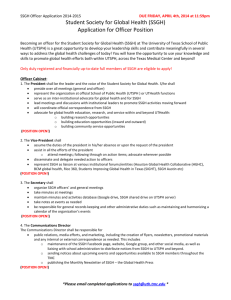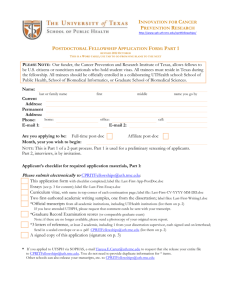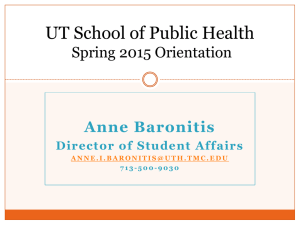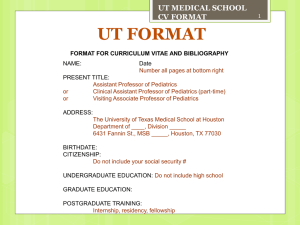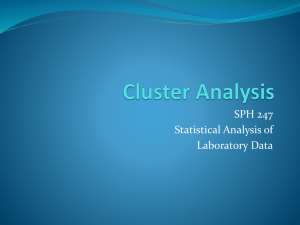Required - University of Texas School of Public Health
advertisement
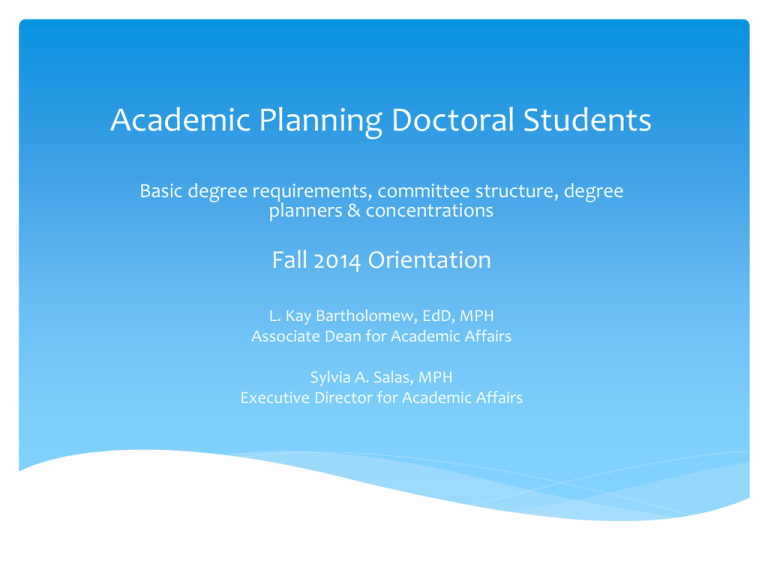
Academic Planning Doctoral Students Basic degree requirements, committee structure, degree planners & concentrations Fall 2014 Orientation L. Kay Bartholomew, EdD, MPH Associate Dean for Academic Affairs Sylvia A. Salas, MPH Executive Director for Academic Affairs Welcome to the UTSPH! We are excited to have you here as part of our community of scholars UTSPH– Unique among all Schools of Public Health Six campuses Two time zones UTSPH spans the State of Texas Texas covers >268,000 square miles Research, Education, Community Service Objectives Describe our academic philosophy, student & faculty responsibilities Academic Advising - Milestones Agreement & Tracking Form Describe the structure & requirements of your degree program (hours, core, practicum, timing, etc.) Describe how to use the degree-planning form Describe majors, minors and breadth (doctoral students) Describe preliminary exam (doctoral) Our Academic Philosophy Students are expected to take ownership of their academic destinies Faculty serve as guides for students to navigate their academic programs Academic Advising All doctoral students are assigned a faculty advisor Admissions goal statement used to match to a faculty advisor with research expertise that supports your interests “Go to” faculty for course selection, academic planning, and sign off on administrative processes This relationship requires your active participation in the process Milestones Agreement and Tracking Form Staff advisors are available in each Division to assist faculty with course scheduling, policy changes, deadlines, etc. Shared Responsibility for Your Education Your Responsibilities Be proactive in your academic life. Know the requirements for your degree. Be able to articulate what you wish to do with your degree. Have a plan. Faculty Responsibilities Be available to you. Provide guidance for course selection. Assist you in setting realistic goals. Foster your professional development. Evaluation & Planning Visualize graduation NOW….. This is the first step in your academic planning process Evaluation Week ALL students meet with their Advisors (and committees when formed) at the end of the Fall and Spring terms. Academic review, tracking progress & planning Failure to attend evaluation meeting will result in a HOLD being placed on your continued registration As with any relationship….Communication is KEY All official school communication occurs via UT email Required to keep it functional & check it regularly Evaluations meetings are scheduled centrally NO travel plans before you have your meeting unless you have made prior arrangements with your advisor / committee Plan to Graduate NOW – Practicum Experience (DrPH) Understand the Practicum Experience (DrPH) When? Optimally, toward the end of your coursework How? Work with the Office of Public Health Research to plan your experience Public Health Practice (https://sph.uth.edu/practicum/) What? A work experience in the community Accompanied by online seminar; ~ 180 contact hrs Paid or unpaid DIFFERENT from your usual work Planning to Graduate – NOW The Dissertation Begin thinking about your research interests from day 1 of your academic career at UTSPH This is an important step in building your portfolio of elective courses and research experiences that will support your ultimate research interests. Your dissertation is not the work of your lifetime…..it is but the first step in demonstrating your ability to conceive and carry out independent research We will help you get there Academic Planning Programs of Study Degrees offered at UTSPH DrPH – Doctor of Public Health PhD – Doctor of Philosophy All Degree Programs are Competency-Based What you will be able to do… A foundation for the curriculum Academic progress measured against program competencies All competencies mastered before graduation Core Competency Model Availability of Doctoral Programs All of the Divisional Doctoral programs (DrPH & PhD) are available at the Houston Campus Regional Campuses offer the following Doctoral programs PhD Epidemiology – all Regional Campuses except El Paso DrPH Health Promotion & Behavioral Sciences – all Regional Campuses except San Antonio PhD Behavioral Sciences – Austin and Dallas Regional Campus ONLY DrPH Community Health Practice – San Antonio Regional Campus ONLY DrPH Environmental & Occupational Health – San Antonio Regional Campus ONLY Students are expected to attend classes at the campus to which they are admitted Program Structures Within degree programs, the structures are similar in terms of total credit hour requirements and other elements particular to the degree (e.g., DrPH, PhD). Discipline-based requirements vary within the overall structure of the degree program. Degree Program Information (https://sph.uth.tmc.edu/academics/degreeprograms/) Structure of the DrPH Program Minimum 48 credit hour requirement Maximum of 9 combined credit hours of practicum & dissertation count toward the 48 credit hours requirement (minimum 39 credit hours coursework) Two discipline-based minors OR one minor & one breadth area are required Satisfactory completion of at least one Epidemiology course if not already covered in the minor or breadth Structure of DrPH Program Minor / Breadth • https://sph.uth.edu/content/u ploads/2010/05/FINAL-Stepsfor-Establishing-DoctoralMajor-Minor-Breadth.pdf Structure of the DrPH Program DrPH Program Information (https://sph.uth.tmc.edu/academics/degreeprograms/doctor-of-public-health-drph/) Satisfactory completion of a preliminary examination following completion of specified courses in the major Satisfactory defense of the dissertation proposal Satisfactory completion of an original research dissertation and final presentation Must be registered for at least 3 credit hours in the term of graduation Structure of the PhD Program Minimum 48 credit hour requirement (72 credit hour requirement for direct admit to PhD available in Biostatistics & Epidemiology only) Maximum of 9 combined credit hours of dissertation count toward the 48 credit hour requirement (39 credit hours minimum coursework) Two discipline-based minors OR one minor & one breadth area are required Satisfactory completion of at least one Epidemiology course if not already covered in the minor or breadth Structure of PhD Program Minor / Breadth • https://sph.uth.edu/content/u ploads/2010/05/FINAL-Stepsfor-Establishing-DoctoralMajor-Minor-Breadth.pdf Structure of the PhD Program PhD Program Information (https://sph.uth.tmc.edu/academics/degreeprograms/doctor-of-philosophy-phd/) Satisfactory completion of a preliminary examination following completion of specified courses in the major Satisfactory defense of the dissertation proposal Satisfactory completion of an original research dissertation and final presentation Must be registered for at least 3 credit hours in the term of graduation Concentrations Concentrations are available to all degree-seeking students These options allow students to focus their elective course selections on an interdisciplinary public health field Consist of 9 to 14 credit hours of coursework Requires approval prior to adding a concentration Requires a committee member from the respective concentration Requires concentration focus in dissertation https://sph.uth.edu/academics/concentrations/ Information Session on Thursday, August 21st, 1:00 pm 102 A&B Concentrations Degree planners Each degree program has a sample degree planner that is intended to facilitate your ability to plan your academic course selection & timing Going back to the beginning of this presentation……talk to your Advisor Degree Planners Specific to Term of Program Entry Where to find information for academic planning The School & Division web pages include all of the important information regarding your program requirements Bookmark your Divisional web page https://sph.uth.edu/academics/ Other sources of information: Current catalog (2014-2016 Catalog & Addendum) SPH Student Affairs Staff & Associate Dean Associate Dean for Academic Affairs & Academic Affairs Staff Staff advisors for details such as deadlines, timing of course offerings, etc. Last but not least…. Enjoy yourselves! Learn from one another Experience as much as you can while you are at the UTSPH Closing the loop…..you are responsible for getting as much out of your experience here as you can Our job is to help you accomplish this task
